Мне всегда казалось, что писать о музыке как следует сможешь только если ничего не боишься. Поэтому по-настоящему хорошо у меня получалось очень редко или никогда. Текст Ника Кейва о группе Einstürzende Neubauten из книжки "King Ink".
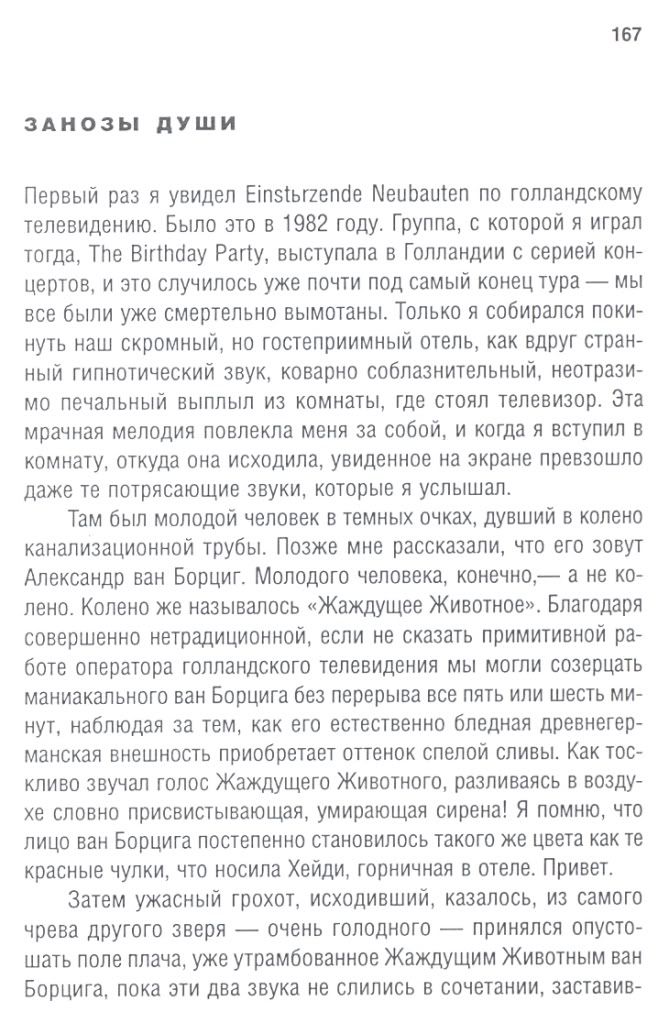
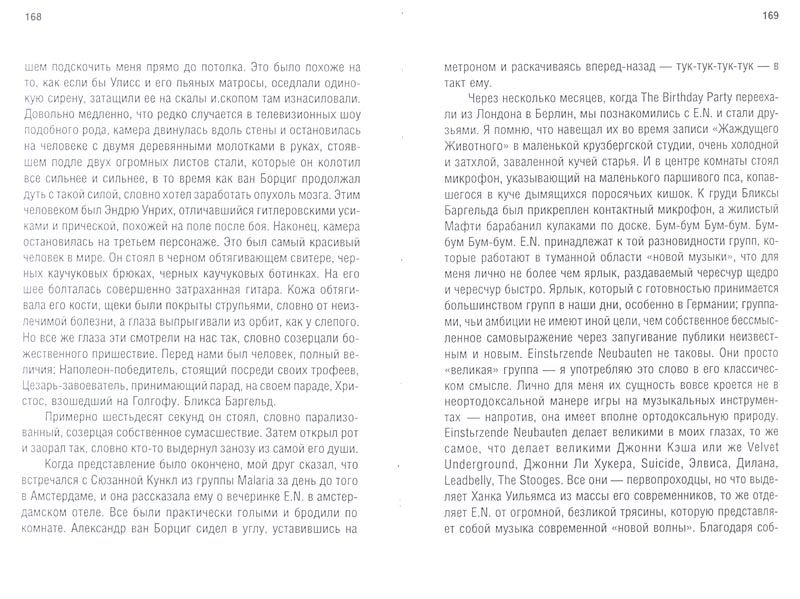


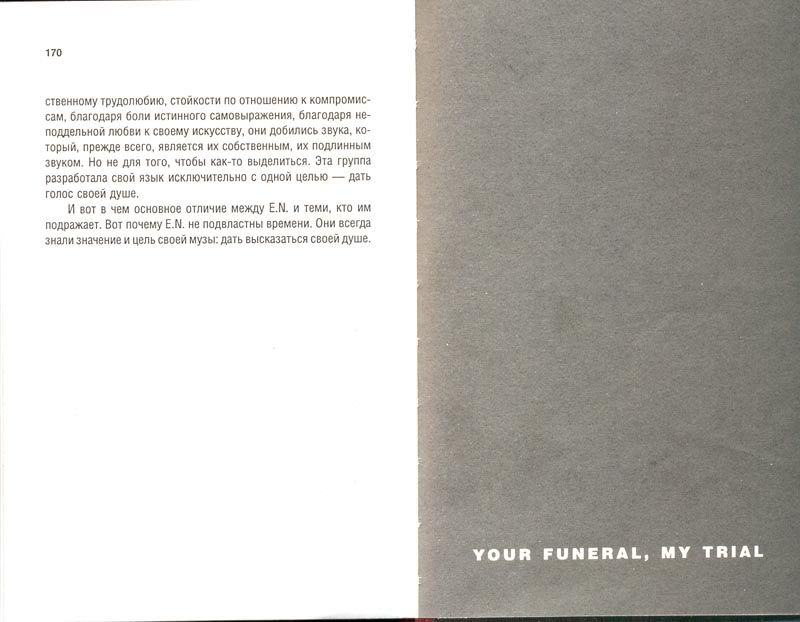
Only fearless, reckless and ones full of love are good in writing about music. Thistles in the soul essay by Nick Cave.
The first time I saw EINSTÜRZENDE NEUBAUTEN was on Dutch TV. It was the year 1982. The group I had back then - THE BIRTHDAY PARTY - was doing a string of concerts in Holland, and it was toward the end of the tour - we were all near the brick of death. I was just making my way down the stairs of our humble but obliging hotel when an eerie, hypnotic sound came floating from the TV room, insidiously seductive, irresistably sad. To these baleful strains I found myself drawn, and as I stepped into the TV room all the notions of music that I held so precious were obliterated - in toto - by what I saw upon the screen.
There was a young man, wearing thick glasses, blowing into a bent drainpipe. Later I was informed that the name was Alexander von Borsig. The name of the young man, that is - not the drainpipe. The drainpipe was called the "Thirsty Animal". Thanks to the typically unorthodox, if not downright primitive Dutch camera-work, we were make to watch the manic von Borsig without interruption for all of five or six minutes, seeing his naturally pale teutonic complexion deepen with the passing seconds to that of a ripe plum. How lonely the cry of the Thirsty Animal seemed, its weird pule hanging in the air like a wheezing, dying siren, I remember von Borsig's face turn the exact colour of the red stockings worn by Heidi, the hotel maid. Hello.
Then a terrible rumbling, that seemed to come from the gut of a beast - a hungry one - began to ravage the weeping-ground trodden by von Borsig's Thirsty Animal until the two were united in a sordid copulation of sound that hit me right in the dick. It was like Ulysses & his drunken sailors had jumped a lone siren, rolled her over & pack-raped her there on the rocks. And with a patience one seldom sees in this sort of TV music show, the camera moved across the stage and froze on a man holding two mallets, standing next to two large pieces of corrogated sheet-metal, which he bludgeoned louder and louder, while von Borsig kept blowing - working on a brain tumour. This man was Endruh Unruh, complete with Hitler-moustache and a head like a battlefield. Finally, the camera found the third man. He was the most beautiful man in the world. He stood there in a black leotard and black rubber pants, black rubber boots. Around his neck hung a thoroughly fucked guitar. His skin cleared to his bones, his scull was a utter disaster, scabbed and hacked, and his eyes bulged out of their orbits like a blind man's. And yet, the eyes stared at us as if to herald some divine visitation. Here stood a man on the trashold of greatness; here stood a Napoleon victorious amongst his spoils, a conquering Caesar parading his troops, a Christ akimbo an Calvary. Blixa Bargeld.
For sixty seconds, this man stood as if paralyzed, hexed by his own madness. Then he opened his mouth and let out a scream that sounded like someone was pulling a thistle out of his soul.
After the TV show, a friend of mine told me he had met Susanna Kunke - of MALARIA - the day before, and she had told him about a party with E.N. in an Amsterdam hotel. They had all been naked - mucking about. Alexander von Brosig had sat in a corner, staring at a metronome and rocking back and forth - tock tock tock tock tock - to it's rhythm.
A few month later, after THE BIRTHDAY PARTY had moved from London to Berlin, we got to know E.N. and became friends. I remember visiting them while they were recording "Thirsty Animal" in a small Kreuzberg studio; the studio was cold and fusty and full of amps, trash and steel. And in the middle of the room a microphone pointed to a small, mangy dog rooting around in a steaming pile of pig guts. Blixa Bargeld had a contact-mike taped to his chest, while the muscle-bound Mufti beat on this natural sounding-board with his fists. Boom-Boom Boom-Boom. Boom-Boom Boom-Boom. E.N. belong to that mass of bands that operate in the nebulous area of "Innovative Music", which to me, is a title applied much too quickly and much too generously. And which is all too readily embraced by so many groups these days, particularly in Germany; groups whose ambitions have no other end than their own meaningless self-perpetuation through the intimidation of the unknown, the new. Not so EINSTÜRZENDE NEUBAUTEN. They are simply a "great" band - and I use the word in the classical sense. To me, the essence of their greatness does not lie in their unorthodox attitude toward making music - rather it is based on a fundamentally orthodox premise. What makes E.N. great in my eyes is the same thing that makes Johnny Cash - or the VELVET UNDERGROUND Underground, John Lee Hooker, SUICIDE, Elvis, Dylan, Leadbelly, THE STOOGES - great. They are all innovators but what sets Hank Williams apart from the bulk of his contemporaries is the same thing that sets E.N. apart from the huge, faceless morass that modern New Wave music has become. Through their own hard work, by steadfast lack of compromise, trough the pain of true pain of self-expression, through a genuine love of their medium, they have attained a sound which is first authentic, and which is utterly their own. But not for the sole purpose of being different. They are a group which has developed its own special language for one reason - to give voice to their souls.
And this is the fundamental difference between E.N. and those who imitate them. This is why E.N. will remain timeless. They have always known the meaning and purpose of their medium: to give vent to the expression of the soul.
Nick Cave
from "King Ink"
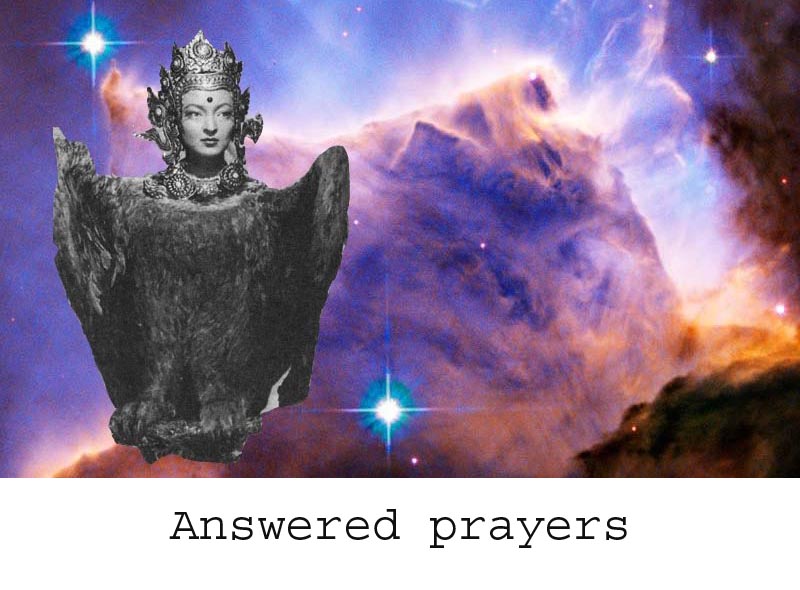

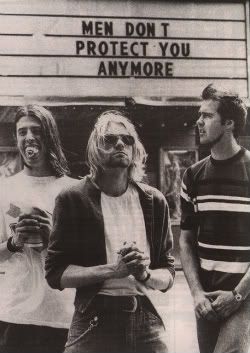
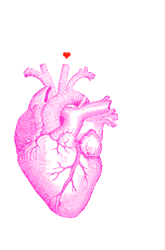
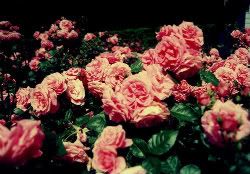
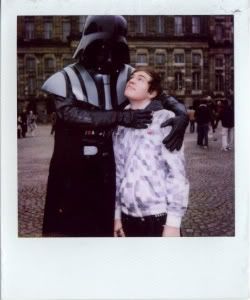

Комментариев нет:
Отправить комментарий